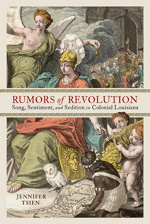Today, we are happy to bring you our conversation with Jennifer Tsien, author of Rumors of Revolution: Song, Sentiment, and Sedition in Colonial Louisiana.
What inspired you to write this book?
I wondered what was happening in New Orleans while the Enlightenment and Revolution were happening in France. I had grown up in New Orleans and then began my career studying French literature, so these two things were separate in my mind. But in fact, they were a lot of connections between this city and the politics and ideas of eighteenth- century France.
What did you learn and what are you hoping readers will learn from your book?
First, that there was a dialogue between the colonies and the metropole; what happened in the Americas, for example, could provoke people to riot in France or influence what philosophers wrote about tyranny, and vice versa. Secondly, to those people who are not familiar with the French monarchy, I wish to show them all the different ways people eluded censorship and oppression. Even though people could be arrested for saying anything against the king and his imperialist policies, people’s complaints seeped into popular songs, history books, novels, and even just cries in the street.
What surprised you the most in the process of writing your book?
I was surprised about the New Orleans revolt of 1768, when French citizens got angry that the French king gave Louisiana to Spain. It’s a revolt that has been mostly forgotten. It was a bold move, like other provincial revolts in previous centuries, but this one had eloquent manifestos, used Enlightenment tropes, and anticipated Revolutionary rhetoric.
What’s your favorite anecdote from your book?
Probably the song that mocked Spanish governor Carondelet in the 1790s. Several citizens of French descent – white landowners, free people of color, and enslaved people -- were arrested for singing a song based on a French Revolutionary song called “La Carmagnole” but they changed it to mock Carondelet as “Cochon de lait” or suckling pig. This kind of satire is still typical of New Orleans humor – they add local flavor to nationally-known songs all the time, for example “The Twelve Yats of Christmas” or “Rudy the Big-Booty Reindeer.” Also, New Orleanians unwittingly brought back the governor-as-suckling pig trope at a Mardi Gras parade in 2006, with an effigy of Ray Nagin as a suckling pig, labelled “Cochon de Ray.”
What’s next?
My next book, Secrets of New Orleans, shows how the city is misrepresented in popular culture as full of dangerous, secretive cults: vampires, vodou practitioners, Mardi Gras krewes, murderous Creoles, etc. Then I argue that artists with local ties such as Beyoncé and Anne Rice take this trope and turn it on its head. I’ve already written sections about the James Bond film Live and Let Die and the Disney film The Princess and the Frog.





